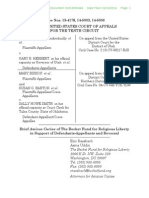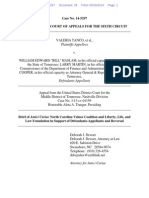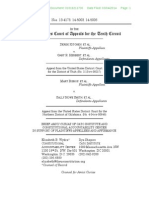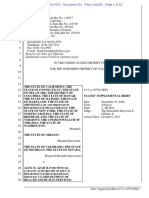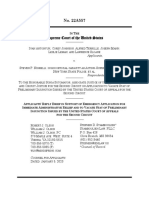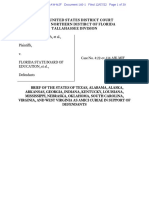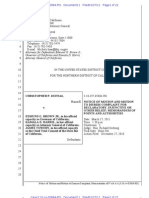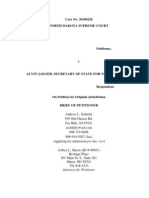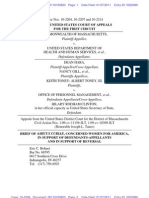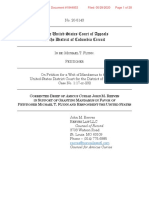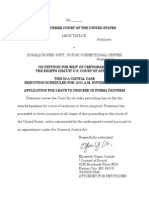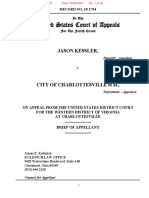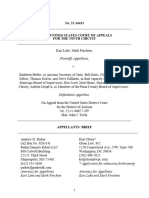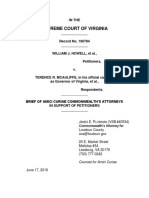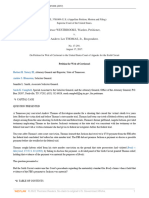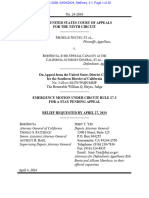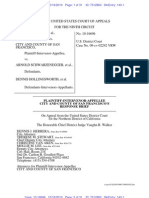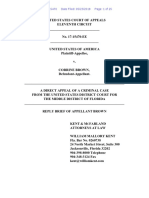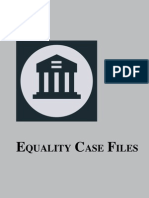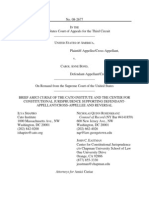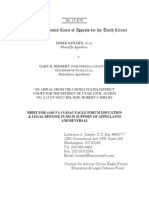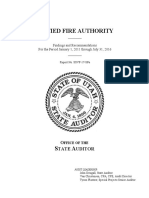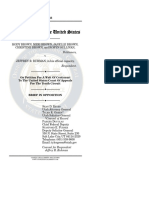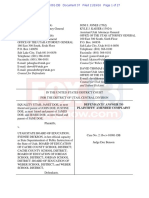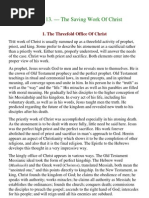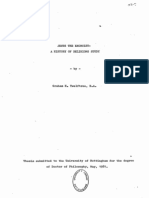LDS Church Amicus
LDS Church Amicus
Uploaded by
Ben WinslowCopyright:
Available Formats
LDS Church Amicus
LDS Church Amicus
Uploaded by
Ben WinslowCopyright
Available Formats
Share this document
Did you find this document useful?
Is this content inappropriate?
Copyright:
Available Formats
LDS Church Amicus
LDS Church Amicus
Uploaded by
Ben WinslowCopyright:
Available Formats
Appellate Case: 13-4178
Document: 01019200417
Date Filed: 02/10/2014
Page: 1
Case Nos. 13-4178, 14-5003, 14-5006 UNITED STATES COURT OF APPEALS FOR THE TENTH CIRCUIT Appeal from the United States DEREK KITCHEN, individually, District Court for the District of et al., Utah, Plaintiffs-Appellees, Civil Case No. 2:13-CV-00217v. RJS GARY R. HERBERT, in his official capacity as Governor of Utah, et al., Defendants-Appellants. Appeal from the United States MARY BISHOP, et al., District Court for the Northern Plaintiffs-Appellees, District of Oklahoma, and Civil Case No. 04-CV-848-TCKSUSAN G. BARTON, et al., TLW Plaintiffs-Appellees/CrossAppellants, v. SALLY HOWE SMITH, in her official capacity as Court Clerk for Tulsa County, State of Oklahoma, Defendant-Appellant/CrossAppellee. __________________________________________
Brief of Amici Curiae United States Conference of Catholic Bishops; National Association of Evangelicals; The Church of Jesus Christ of Latter-Day Saints; The Ethics & Religious Liberty Commission of the Southern Baptist Convention; and Lutheran ChurchMissouri Synod In Support of Defendants-Appellants and Supporting Reversal
__________________________________________
ANTHONY R. PICARELLO, JR. General Counsel U.S. CONFERENCE OF CATHOLIC BISHOPS 3211 Fourth Street, N.E. Washington, D.C. 20017 (202) 541-3300 Alexander Dushku R. Shawn Gunnarson Justin W Starr KIRTON | MCCONKIE 60 East South Temple, Suite 1800 Salt Lake City, UT 84111 (801) 328-3600
Attorneys for Amici Curiae Religious Organizations
Appellate Case: 13-4178
Document: 01019200417
Date Filed: 02/10/2014
Page: 2
CORPORATE DISCLOSURE STATEMENT Pursuant to Rule 26.1 of the Federal Rules of Appellate Procedure, the undersigned states that none of the religious organizations that join this brief issues stock or has a parent corporation that issues stock. s/Alexander Dushku Alexander Dushku Attorney for Amici Curiae Religious Organizations February 10, 2014
ii
Appellate Case: 13-4178
Document: 01019200417
Date Filed: 02/10/2014
Page: 3
TABLE OF CONTENTS CORPORATE DISCLOSURE STATEMENT............................................ii TABLE OF CONTENTS .......................................................................... iii TABLE OF AUTHORITIES ....................................................................... v FED. R. APP. P. 29 (c)(5) STATEMENT .................................................. xi IDENTITY AND INTEREST OF AMICI .................................................. 1 INTRODUCTION ....................................................................................... 2 ARGUMENT ............................................................................................... 5 I. Utahs and Oklahomas Marriage Amendments Should Not Be Invalidated or Subjected to Closer Judicial Scrutiny Based on False Accusations of Animus ........................................................... 5 A. We Defend Traditional Marriage Out of Fidelity to Religious Beliefs That Include But Transcend Teachings About Human Sexuality, Not Out of Animus ...................................................... 7 We Defend Traditional Marriage to Protect Vital Interests in the Welfare of Children, Families, and Society......................... 11 1. Procreation and Child-Rearing Ideally Occur Within a Stable Marriage Between a Man and a Woman ................................. 11 2. Limiting Marriage to Male-Female Couples Furthers Powerful State Interests .......................................................... 15 C. We Support Laws Protecting Traditional Marriage to Safeguard the Marriage Institution Against Judicial Redefinition ................................................................................. 19 Utahs and Oklahomas Laws Reserving Marriage for a Man and a Woman Are Not Invalid Expressions of Animus ....................... 20 Allegations of Animus Are Relevant Only If a Law Can Be Explained Solely By Animus with No Other Possible Rationale ..................................................................................................... 21 Neither Windsor Nor Romer Justifies This Court in Construing Utah and Oklahoma Marriage Laws As Expressions of Impermissible Animus. .............................................................. 22
B.
II. A.
B.
iii
Appellate Case: 13-4178
Document: 01019200417
Date Filed: 02/10/2014
Page: 4
C.
This Court Should Reject Arguments Invoking Animus as a Justification for Nullifying State Marriage Laws ..................... 27
III. Utahs and Oklahomas Marriage Amendments Are Not Invalid Under the Establishment Clause Because They Were Informed by Religious and Moral Viewpoints .................................................... 29 CONCLUSION ......................................................................................... 35 CERTIFICATE OF COMPLIANCE WITH TYPE-VOLUME ................ 37 CERTIFICATE OF SERVICE.................................................................. 38 CERTIFICATE OF DIGITAL SUBMISSION ......................................... 39 ADDENDUMSTATEMENTS OF INTEREST OF THE AMICI ......... 40
iv
Appellate Case: 13-4178
Document: 01019200417
Date Filed: 02/10/2014
Page: 5
TABLE OF AUTHORITIES CASES
Bishop v. United States ex rel Holder
___F.Supp.2d ___, 2014 WL 116013 (N.D. Okla. Jan. 14, 2014) .... 5, 20
Board Ed. Westside Cnty. Schs. (Dist. 66) v. Mergens Board Trustees Univ. Ala. v. Garrett Bond v. United States
496 U.S. 226 (1990) ................................................................... 21, 30, 33 531 U.S. 356 (2001) ......................................................................... 22, 24 564 U.S. ___, 131 S. Ct. 2355 (2011) ..................................................... 28 508 U.S. 520 (1993) ............................................................................... 34 486 U.S. 456 (1988) ............................................................................... 27
Church of Lukumi Babalu Aye, Inc. v. City of Hialeah Clark v. Jeter
College Savings Bank v. Florida Prepaid Postsecondary Educ. Expense Bd. Cook v. Gates
527 U.S. 666 (1999) ............................................................................... 29 528 F.3d 42 (1st Cir. 2008) .................................................................... 26 397 U.S. 471 (1970) ............................................................................... 32 413 U.S. 528 (1973) ............................................................................... 26
Dandridge v. Williams
Dept of Agric. v. Moreno Edwards v. Aguillard
482 U.S. 578 (1987) ............................................................................... 33
Appellate Case: 13-4178
Document: 01019200417
Date Filed: 02/10/2014
Page: 6
Goodridge v. Dept of Pub. Health Griswold v. Connecticut Harris v. McRae
798 N.E.2d 941 (Mass. 2003) ................................................................ 13 381 U.S. 479 (1965) ................................................................................. 3 448 U.S. 297 (1980) ......................................................................... 31, 33 379 U.S. 241 (1964) ......................................................................... 32, 33 855 N.E. 2d 1 (N.Y. 2006) .................................................................. 7, 14 183 P.3d 384 (Cal. 2008) ....................................................................... 16 397 U.S. 358 (1970) ............................................................................... 33 ___ F.Supp.2d ___, 2013 WL 6697874 (D. Utah Dec. 20, 2013)........... 20 539 U.S. 558 (2003) ................................................................................. 6 358 F.3d 804 (11th Cir. 2004) ............................................................... 13 125 U.S. 190 (1888) ................................................................................. 6 435 U.S. 618 (1978) ......................................................................... 34, 35
Heart of Atlanta Motel, Inc. v. United States Hernandez v. Robles
In re Marriage Cases In re Winship
Kitchen v. Herbert Lawrence v. Texas
Lofton v. Secy of Dept of Children and Family Servs. Maynard v. Hill
McDaniel v. Paty
vi
Appellate Case: 13-4178
Document: 01019200417
Date Filed: 02/10/2014
Page: 7
McGowan v. Maryland Milner v. Apfel
366 U.S. 420 (1961) ......................................................................... 32, 33 148 F.3d 812 (7th Cir. 1998) ................................................................. 26 821 N.E.2d 15 (Ind. Ct. App. 2005) ....................................................... 12 114 U.S. 15 (1885) ................................................................................... 4 376 U.S. 254 (1964) ............................................................................... 34 442 U.S. 256 (1979) ............................................................................... 21 517 U.S. 620 (1996) ................................................................... 21, 22, 26 411 U.S. 1 (1973) ............................................................................. 25, 28 374 U.S. 203 (1963) ............................................................................... 30 419 U.S. 393 (1975) ............................................................................... 23 482 U.S. 78 (1987) ................................................................................... 3 391 U.S. 367 (1968) ............................................................................... 21
Morrison v. Sadler
Murphy v. Ramsey
New York Times Co. v. Sullivan
Personnel Admr of Mass. v. Feeney Romer v. Evans
San Antonio Indep. School Dist. v. Rodriguez School Dist. of Abington Twp. v. Schempp Sosna v. Iowa
Turner v. Safley
United States v. OBrien
vii
Appellate Case: 13-4178
Document: 01019200417
Date Filed: 02/10/2014
Page: 8
United States v. Windsor
570 U.S. ___, 133 S. Ct. 2675 (2013) ............................................. passim 521 U.S. 702 (1997) ............................................................................... 20
Washington v. Glucksberg
Williams v. North Carolina
317 U.S. 287 (1942) ................................................................................. 6
CONSTITUTIONAL PROVISIONS AND RULES Fed. R.App.P 26.1 .......................................................................................ii Fed. R. App. P. 29 ...................................................................................... xi Fed. R. App. P 32 ...................................................................................... 37 U.S. CONST. amend. 1 ............................................................................... 30 OTHER AUTHORITIES Barack Obama, Call to Renewal Keynote Address (June 28, 2006) ...... 31 Brief Amici Curiae of James Q. Wilson et al., Legal and Family Scholars In Support of Appellees ......................................................................... 15 CATECHISM OF THE CATHOLIC CHURCH (2d ed. 1994) ................................. 8 CLINTON ROSSITER, SEEDTIME OF THE REPUBLIC: THE ORIGIN OF THE AMERICAN TRADITION OF POLITICAL LIBERTY (1953) ............................. 30 Cynthia C. Harper & Sara S. McLanahan, Father Absence and Youth Incarceration, 14 J. RES. ON ADOLESCENCE 369 (2004) ........................ 14 DAVID POPENOE, LIFE WITHOUT FATHER: COMPELLING NEW EVIDENCE THAT FATHERHOOD & MARRIAGE ARE INDISPENSABLE FOR THE GOOD OF CHILDREN & SOCIETY (1996) .................................................................. 15
viii
Appellate Case: 13-4178
Document: 01019200417
Date Filed: 02/10/2014
Page: 9
Eric G. Andersen, Children, Parents, and Nonparents: Protected Interests and Legal Standards, 1998 BYU L. REV. 935 ....................... 13 ESV STUDY BIBLE (2008) ............................................................................ 9 I HAVE A DREAM: WRITINGS AND SPEECHES THAT CHANGED THE WORLD (James Melvin Washington ed., 1992).................................................. 31 IDA HUSTED HARPER, LIFE AND WORKS OF SUSAN B. ANTHONY (1908). ... 31 INSTITUTE FOR AMERICAN VALUES, MARRIAGE AND THE LAW: A STATEMENT OF PRINCIPLES (2006) ............................................................................. 18 JOHN WITTE JR., FROM SACRAMENT TO CONTRACT: MARRIAGE, RELIGION, AND LAW IN THE WESTERN TRADITION 17 (2d ed. 2012) ........................ 18 KRISTIN ANDERSON MOORE ET AL., CHILD TRENDS, MARRIAGE FROM A CHILDS PERSPECTIVE: HOW DOES FAMILY STRUCTURE AFFECT CHILDREN AND WHAT CAN WE DO ABOUT IT? (June 2002) .............. 13, 14 Letter from Susan B. Anthony to Dr. George E. Vincent (Aug. 1904) ... 31 Maggie Gallagher, (How) Will Gay Marriage Weaken Marriage As a Social Institution: A Reply to Andrew Koppelman, 2 U. ST. THOMAS L.J. 33 (2004) ......................................................................................... 12 Martin Luther King, I Have a Dream (1963) .......................................... 31 MARY ANN GLENDON, ABORTION AND DIVORCE IN WESTERN LAW: AMERICAN FAILURES, EUROPEAN CHALLENGES (1987) .......................... 17 Matthew B. OBrien, Why Liberal Neutrality Prohibits Same-Sex Marriage: Rawls, Political Liberalism, and the Family, 2012 BRIT. J. AM. LEG. STUD. 411 ................................................................................ 14 Ralph Wedgwood, The Fundamental Argument for Same-Sex Marriage, 7 J. POL. PHIL. 225 (1999) ...................................................................... 18
ix
Appellate Case: 13-4178
Document: 01019200417
Date Filed: 02/10/2014
Page: 10
Sherif Girgis, Robert P. George, & Ryan T. Anderson, What is Marriage?, 34 HARV. J.L. & PUB. POLY 245 (2011) .............................. 17 The Church of Jesus Christ of Latter-day Saints, Newsroom, The Divine Institution of Marriage (Aug. 13, 2008)................................................ 10 THE FIRST PRESIDENCY AND COUNCIL OF THE TWELVE APOSTLES OF THE CHURCH OF JESUS CHRIST OF LATTER-DAY SAINTS, THE FAMILY: A PROCLAMATION TO THE WORLD (Sept. 23, 1995) .................................... 10 THE HOLY BIBLE (RSV) ........................................................................... 7, 9 W. BRADFORD WILCOX ET AL., WHY MARRIAGE MATTERS (2d ed. 2005) ... 14 WILLIAM LEE MILLER, LINCOLNS VIRTUES (2002) ................................... 30
Appellate Case: 13-4178
Document: 01019200417
Date Filed: 02/10/2014
Page: 11
FED. R. APP. P. 29 (c)(5) STATEMENT Pursuant to Rule 29 (c)(5), the undersigned states that counsel for the parties have not authored any part of this brief and no party or counsel for any party contributed money to fund any part of the preparation or submission of this brief. written consent of all parties. This brief is filed with the
xi
Appellate Case: 13-4178
Document: 01019200417
Date Filed: 02/10/2014
Page: 12
IDENTITY AND INTEREST OF AMICI The voices of millions of Americans are represented in the broad cross-section of faith communities that join in this brief. Our
theological perspectives, though often differing, converge on a critical point: that the traditional, husband-wife definition of marriage is vital to the welfare of children, families, and society. Faith communities like ours are among the essential pillars of this Nations marriage culture. With our teachings, rituals, traditions, and ministries, we sustain and nourish both individual marriages and a culture that makes enduring marriages possible. We have the deepest interest in strengthening the time-honored institution of husband-wife marriage because of our religious beliefs and also because of the benefits it provides to children, families, and society. Our practical experience in this area is
unequaled. In millions of ministry settings each day we see the benefits that married mother-father parenting brings to children. And we deal daily with the devastating effects of out-of-wedlock births, failed marriages, and the general decline of the venerable husband-wife marriage institution.
Appellate Case: 13-4178
Document: 01019200417
Date Filed: 02/10/2014
Page: 13
We therefore seek to be heard in the democratic and judicial forums where the fate of that foundational institution will be decided. This brief is submitted out of a shared conviction that the United States Constitution does not prohibit the People of Utah and Oklahoma from decidingdirectly or through their elected representativesto preserve the husband-wife definition of marriage. Statements of interest of the
amici are found in the Addendum.
INTRODUCTION A common theme has arisen among advocates for redefining marriage to include same-sex couples: that those who oppose them
must be irrational or even bigotedthat they are motivated by antigay animus, whether in the form of unthinking ignorance or actual hostility. Such aspersions, which take various forms, are often cast at people and institutions of faith. The accusation is false and offensive. It is intended to suppress rational dialogue and democratic conversation, to win by insult and intimidation rather than by reason, experience, and fact. In truth, we support the husband-wife definition of marriage because we believe it is right and good for children, families, and society. Our respective faith
Appellate Case: 13-4178
Document: 01019200417
Date Filed: 02/10/2014
Page: 14
traditions teach us that truth. But so do reason, long experience, and social fact. We are among the many religions [that] recognize marriage as having spiritual significance, Turner v. Safley, 482 U.S. 78, 96 (1987), indeed as being truly sacred, Griswold v. Connecticut, 381 U.S. 479, 486 (1965). Our respective religious doctrines hold that marriage
between a man and a woman is sanctioned by God as the right and best setting for bearing and raising children. We believe that children,
families, society, and our Nation thrive best when husband-wife marriage is upheld and strengthened as a cherished, primary social institution. The family lives of millions of Americans are ordered
around and given deep meaning and stability by these beliefs. The value we place on traditional, husband-wife marriage is also influenced by rational judgments about human nature and the needs of individuals and society (especially children) and by our collective experience counseling and serving millions of followers over countless years. For these reasons, too, we are convinced that traditional
marriage is indispensable to social welfare and our republican form of government.
Appellate Case: 13-4178
Document: 01019200417
Date Filed: 02/10/2014
Page: 15
As our faith communities seek to sustain and transmit the virtues of husband-wife marriage and family life, our teachings and rituals seldom focus on sexual orientation or homosexuality. Our support for the established meaning of marriage arises from an affirmative vision of the family, as consisting in and springing from the union for life of one man and one woman in the holy estate of matrimony, Murphy v.
Ramsey, 114 U.S. 15, 44 (1885), and not from animosity toward anyone.
In this brief we demonstrate that Utahs and Oklahomas marriage laws should not be overturned based on the spurious charge that religious organizations support such laws out of animus. Our faith communities bear no ill will toward same-sex couples, but rather have marriage-affirming religious beliefs that merge with both practical experience and sociological fact to convince us that retaining the husband-wife marriage definition is essential. We further demonstrate that under Supreme Court jurisprudence the notion of animus holds limited relevanceand none here. Finally, we refute the suggestion that the Establishment Clause limits the fundamental right of persons and institutions of faith to participate fully in the democratic process.
Appellate Case: 13-4178
Document: 01019200417
Date Filed: 02/10/2014
Page: 16
The fact that religious believers support Utahs and Oklahomas marriage laws by no stretch undermines their constitutional validity. ARGUMENT I. Utahs and Oklahomas Marriage Amendments Should Not Be Invalidated or Subjected to Closer Judicial Scrutiny Based on False Accusations of Animus. Plaintiffs in the Utah case argued below that State laws defining marriage as the union of a man and a woman are based on a desire to harm [same-sex couples], and no legitimate purpose overcomes the States purpose and effect of disparaging and injuring . . . gay and lesbian citizens. Pls Mot. Summary Judgment, Kitchen v. Herbert, No. 2:13-cv-00217-RJS, at 19 (D. Utah Oct. 13, 2013). The district court in Oklahoma echoed that sentiment when, after canvassing religious beliefs expressed in support of husband-wife marriage, it concluded that Oklahomas marriage laws represent an arbitrary exclusion based upon the majoritys disapproval of the defined class. Bishop v. United
States ex rel Holder, ___F.Supp.2d ___, 2014 WL 116013, at *32 (N.D.
Okla. Jan. 14, 2014). These statements do not represent the reasons we support marriage between a man and a woman. We believe that husband-wife
Appellate Case: 13-4178
Document: 01019200417
Date Filed: 02/10/2014
Page: 17
marriagean institution more basic in our civilization than any other,
Williams v. North Carolina, 317 U.S. 287, 303 (1942)is the most
important relation in life and ha[s] more to do with the morals and civilization of a people than any other institution, Maynard v. Hill, 125 U.S. 190, 205 (1888). Our faiths also teach love and respect for all people. To suggest that our support for traditional marriage is based on hostility is false. That support predates by centuries the controversy over same-sex marriage and has nothing to do with disapproval of any group. Our support for traditional marriage stands on the affirmative belief that husband-wife marriage complements our human natures as male and female, promotes responsible procreation, and provides the best environment for children. Moreover, reducing religious support for traditional marriage to irrational bias ignores rational arguments for traditional marriage that have nothing to do with homosexuality. Obviously, reasons exist to promote the institution of marriage beyond mere moral disapproval of an excluded group.
Lawrence v. Texas, 539 U.S. 558, 585 (2003)
(OConnor, J., concurring). We discuss many of these reasons below. They are arguments supported by eons of history, right reason,
Appellate Case: 13-4178
Document: 01019200417
Date Filed: 02/10/2014
Page: 18
experience, common sense, and social science. They have been accepted by many courts. See e.g., Hernandez v. Robles, 855 N.E. 2d 1 (N.Y. 2006). A. We Defend Traditional Marriage Out of Fidelity to Religious Beliefs That Include But Transcend Teachings About Human Sexuality, Not Out of Animus.
Let us first dispel the myth that hostility lies at the root of religious support for husband-wife marriage. Jesus expressed no
disapproval or hostility when he taught, Have you not read that he who made them from the beginning made them male and female, and said, For this reason a man shall leave his father and mother and be joined to his wife, and the two shall become one flesh? Matthew 19:4-5 (RSV). Nor were the ancient Jewish scriptural texts that Jesus
referenced based on animosity toward anyone. See Genesis 1:27, 2:23 (RSV). Faith communities and religious organizations have a long history of upholding traditional marriage for reasons that have nothing to do with homosexuality. Their support for husband-wife marriage precedes by centuries the very idea of same-sex marriage. Many of this Nations prominent faith traditions have rich religious narratives that extol the
Appellate Case: 13-4178
Document: 01019200417
Date Filed: 02/10/2014
Page: 19
personal, familial, and social virtues of traditional marriage while barely mentioning homosexuality.
The Catholic Tradition.
With a tradition stretching back two
millennia, the Catholic Church recognizes marriage as a permanent, faithful, and fruitful covenant between a man and a woman that is indispensable to the common good.1 Marriage has its origin, not in the will of any particular people, religion, or state, but rather, in the nature of the human person, created by God as male and female. When joined in marriage, a man and woman uniquely complement one another spiritually, emotionally, psychologically, and physically. This makes it possible for them to unite in a one-flesh union capable of participating in Gods creative action through the generation of new human life. Without this unitive complementarityand the corresponding capacity for procreation that is unique to such a unionthere can be no marriage.2 These fundamental Catholic teachings about marriage do not mention and have nothing to do with same-sex attraction.
1 2
See CATECHISM OF THE CATHOLIC CHURCH 1601 (2d ed. 1994). See id at 371-72.
Appellate Case: 13-4178
Document: 01019200417
Date Filed: 02/10/2014
Page: 20
The Evangelical Protestant Tradition.
For five centuries the
various denominational voices of Protestantism have taught marriage from a biblical view focused on uniting a man and woman in a divinely sanctioned companionship for the procreation and rearing of children and the benefit of society. One representative Bible commentary
teaches: Marriage . . . was established by God at creation, when God created the first human beings as male and female (Gen. 1:27) and then said to them, Be fruitful and multiply and fill the earth (Gen. 1:28). . . . Marriage begins with a commitment before God and other people to be husband and wife for life, with [s]ome kind of public commitment being important so that society can know to treat a couple as married and not as single.3 Homosexuality is far from
central to Evangelical teachings on marriage.
The
Latter-day Saint (Mormon) Tradition.
Marriage
is
fundamental to the doctrine of The Church of Jesus Christ of Latter-day Saints. A formal doctrinal proclamation on marriage declares that
[m]arriage between a man and a woman is ordained of God, that [c]hildren are entitled to birth within the bonds of matrimony, and to
3
ESV STUDY BIBLE 2543-44 (2008).
Appellate Case: 13-4178
Document: 01019200417
Date Filed: 02/10/2014
Page: 21
be reared by a father and a mother who honor marital vows with complete fidelity, and that [h]usband and wife have a solemn responsibility to love and care for each other and for their children.4 Strong families based on husband-wife marriage serve as the fundamental institution for transmitting to future generations the moral strengths, traditions, and values that sustain civilization.5 Here again, homosexuality is remote from teachings about marriage and family. * * *
In sum, our religious understandings of marriage are rooted in beliefs about Gods will concerning men, women, children, and society, rather than in the narrower issue of homosexuality. teachings may indeed address homosexual conduct Religious and other
departures from the marriage norm, but such issues are a secondary THE FIRST PRESIDENCY AND COUNCIL OF THE TWELVE APOSTLES OF THE CHURCH OF JESUS CHRIST OF LATTER-DAY SAINTS, THE FAMILY: A PROCLAMATION TO THE WORLD (Sept. 23, 1995), available at http://www.lds.org/topics/family-proclamation.
4
The Church of Jesus Christ of Latter-day Saints, Newsroom, The Divine Institution of Marriage (Aug. 13, 2008), available at http://newsroom.lds.org/ldsnewsroom/eng/commentary/the-divineinstitution-of-marriage.
5
10
Appellate Case: 13-4178
Document: 01019200417
Date Filed: 02/10/2014
Page: 22
and small part of religious discourse on marriage. Indeed, it is only the recent same-sex marriage movement that has made it more common for religious organizations to include discussions of homosexuality in their teachings on marriage. The suggestion that religious support for
husband-wife marriage is rooted in anti-homosexual animus rests on a false portrayal of our beliefs. B. We Defend Traditional Marriage to Protect Vital Interests in the Welfare of Children, Families, and Society.
The social benefits of husband-wife marriages and families with a father and mother are critical for the well-being of society and its children. Utah and Oklahoma have compelling interests in maintaining traditional marriage. 1. Procreation and Child-Rearing Ideally Occur Within a Stable Marriage Between a Man and a Woman. Procreation within a
Every child has a father and a mother.
stable male-female marriage gives a child a uniquely full human context that accounts for both the childs biology and the deeper intentions and commitments of the childs parents. The male-female ideal in marriage and parenting provides children security and other irreplaceable benefits.
11
Appellate Case: 13-4178
Document: 01019200417
Date Filed: 02/10/2014
Page: 23
a.
Sex between men and women presents a social challenge.
[A]n orderly society requires some mechanism for coping with the fact that sexual intercourse commonly results in pregnancy and childbirth.
Morrison v. Sadler, 821 N.E.2d 15, 25-26 (Ind. Ct. App. 2005) (citation
and quotation marks omitted). Marriage provides the important legal and normative link between heterosexual intercourse and procreation on the one hand and family responsibilities on the other. The partners in a marriage are expected to engage in exclusive sexual relations, with children the probable result and paternity presumed. (citation and quotation marks omitted). Husband-wife marriage thus protects child well-being . . . by increasing the likelihood that the childs own mother and father will stay together in a harmonious household.6 That is important because [c]hildren in single-parent families, children born to unmarried mothers, and children in stepfamilies or cohabiting relationships face higher risks of poor outcomes than do children in intact families headed
Id. at 26
Maggie Gallagher, (How) Will Gay Marriage Weaken Marriage As a Social Institution: A Reply to Andrew Koppelman, 2 U. ST. THOMAS L.J. 33, 50-51 (2004).
6
12
Appellate Case: 13-4178
Document: 01019200417
Date Filed: 02/10/2014
Page: 24
by two biological parents.7
As Massachusetts Justice Robert Cordy
observed, while nature forges a link between mother and child, there is no corresponding process for creating a relationship between father and child. . . . The institution of marriage fills this void by formally binding the husband-father to his wife and child, and imposing on him the responsibilities of fatherhood.
Goodridge v. Dept of Pub. Health,
798 N.E.2d 941, 996 (Mass. 2003) (Cordy, J., dissenting). b. Both social science and our own experience have taught that
children thrive best when cared for by both of their biological parents.
Lofton v. Secy of Dept of Children and Family Servs., 358 F.3d 804,
819 (11th Cir. 2004) ([C]hildren benefit from the presence of both a father and mother in the home.). Innate differences between men and women mean that they are not fungible in relation to child rearing.8 From those natural differences it follows that a child benefits from
KRISTIN ANDERSON MOORE ET AL., CHILD TRENDS, MARRIAGE FROM A CHILDS PERSPECTIVE: HOW DOES FAMILY STRUCTURE AFFECT CHILDREN AND WHAT CAN WE DO ABOUT IT? 6 (June 2002), http://www.childtrends.org/files/MarriageRB602.pdf.
7 8
Eric G. Andersen, Children, Parents, and Nonparents: Protected Interests and Legal Standards, 1998 BYU L. REV. 935, 998.
13
Appellate Case: 13-4178
Document: 01019200417
Date Filed: 02/10/2014
Page: 25
having before his or her eyes, every day, living models of what both a man and a woman are like. Hernandez, 855 N.E. 2d at 7. Social science confirms the common-sense understanding that family structure matters for children, and the family structure that helps children the most is a family headed by two biological parents in a low-conflict marriage.9 Indeed, [a] family headed by two married
parents who are the biological mother and father of their children is the optimal arrangement for maintaining a socially stable fertility rate, rearing children, and inculcating in them the [values] required for politically liberal citizenship.10 The critical role of mothers in child development has never been doubted. But now a large and growing body of research demonstrates that the contributions of fathers are equally critical to childrens formation and well-being.11 The burden of social science evidence
MOORE, supra note 7, at 1-2.
Matthew B. OBrien, Why Liberal Neutrality Prohibits Same-Sex Marriage: Rawls, Political Liberalism, and the Family, 2012 BRIT. J. AM. LEG. STUD. 411, 414.
10
WHY MARRIAGE MATTERS (2d ed. 2005); Cynthia C. Harper & Sara S. McLanahan, Father Absence
11
See, e.g., W. BRADFORD WILCOX
ET AL.,
14
Appellate Case: 13-4178
Document: 01019200417
Date Filed: 02/10/2014
Page: 26
supports the idea that gender-differentiated parenting is important for human development and that the contribution of fathers to childrearing is unique and irreplaceable.12 2. a. Limiting Marriage to Male-Female Couples Furthers Powerful State Interests.
Alternative child-rearing arrangements pose significant
risks. The late James Q. Wilson detailed the overwhelming evidence that single and, in particular, fatherless parenting significantly increases the likelihood that a child will experience poverty, suicide, mental illness, physical illness, infant mortality, lower educational achievement, juvenile delinquency, adult criminality, unwed teen parenthood, lower life expectancy, and reduced intimacy with parents. That such social pathologies bear a strong statistical correlation with child-rearing in family structures other than the stable husband-wife marital home with both biological parents is truly sobering.13
and Youth Incarceration, 14 J. RES.
(2004).
12
ON
ADOLESCENCE 369, 385-86
DAVID POPENOE, LIFE WITHOUT FATHER: COMPELLING NEW EVIDENCE THAT FATHERHOOD & MARRIAGE ARE INDISPENSABLE FOR THE GOOD OF CHILDREN & SOCIETY 146 (1996).
See generally Brief Amici Curiae of James Q. Wilson et al., Legal and Family Scholars In Support of Appellees at 41-43, In re Marriage Cases, 15
13
Appellate Case: 13-4178
Document: 01019200417
Date Filed: 02/10/2014
Page: 27
The figures Professor Wilson cites are not merely impersonal statistics. Our faith communities are intimately familiar with the
personal tragedies associated with unwed parenting and family breakdown. We have seen boys, bereft of their fathers or any proper male role model, acting out in violence, joining gangs, and engaging in other destructive social and sexual behaviors. We have cared for and mourned with victims left in their destructive wake. And we have
ministered to those boys in prisons where too many are consigned to live out their ruined lives. We have seen young girls, deprived of the love and affection of a father, engaging in a wide array of selfdestructive behaviors. All too often the result is pregnancy and out-ofwedlock birth, thereby cruelly repeating the cycle. The inescapable truth is that only male-female relationships can create children. Children need their mothers and fathers. And society needs mothers and fathers to raise their children. That, in a nutshell, is why society needs the institution of male-female marriage, and why Utah and Oklahoma are right to specially protect and support it. 183 P.3d 384 (Cal. 2008) (No. S147999), available at http://www.courts.ca.gov/documents/Legal_Family_Scholars_Amicus_ Brief.pdf.
16
Appellate Case: 13-4178
Document: 01019200417
Date Filed: 02/10/2014
Page: 28
b.
In this respect, as in so many others, the law plays an [L]aw is not just an ingenious
important educational function.
collection of devices to avoid or adjust disputes and to advance this or that interest, but also a way that society makes sense of things.14 By reserving marriage for the relationship between a man and a woman, the law encourages socially optimal behavior through an institution that supports and confirms the Peoples deep cultural understanding and the sociological truththat stable mother-father marital unions are best for children. If same-sex partnerships were recognized as
marriages, however, that ideal would be abolished from our law: no civil institution would any longer reinforce the notion that children need both a mother and father; that men and women on average bring different gifts to the parenting enterprise; and that boys and girls need and tend to benefit from fathers and mothers in different ways.15 A gender-neutral marriage definition unavoidably changes the message and function of marriage by altering it to serve the interests of MARY ANN GLENDON, ABORTION AND DIVORCE IN WESTERN LAW: AMERICAN FAILURES, EUROPEAN CHALLENGES 7-8 (1987).
14 15
Sherif Girgis, Robert P. George, & Ryan T. Anderson, What is Marriage?, 34 HARV. J.L. & PUB. POLY 245, 262-63 (2011).
17
Appellate Case: 13-4178
Document: 01019200417
Date Filed: 02/10/2014
Page: 29
adults.16 That would be a case of those in power (adults) using law to bring about change that is self-serving. One may see these kinds of social consequences of legal change as good, or as questionable, or as both. But to argue that these kinds of cultural effects of law do not exist, and need not be taken into account when contemplating major changes in family law, is to demonstrate a fundamental lack of intellectual seriousness about the power of law in American society.17 We reject the charge that the long-established understanding of marriage disrespects persons in same-sex relationships. That
understanding predates by centuries the current debate over same-sex unions.18 But we do agree that changing the legal definition of
Supporters of same-sex marriage typically conceive of marriage primarily as a vehicle for advancing the autonomy interests of adults. See, e.g., Ralph Wedgwood, The Fundamental Argument for Same-Sex Marriage, 7 J. POL. PHIL. 225, 225 (1999) (The basic rationale for marriage lies in its serving certain legitimate and important interests of married couples.).
16
AMERICAN VALUES, MARRIAGE STATEMENT OF PRINCIPLES 26 (2006).
17
INSTITUTE
FOR
AND THE
LAW: A
18
RELIGION, AND LAW IN THE WESTERN TRADITION 17 (2d ed. 2012) (The western tradition inherited from ancient Greece and Rome the idea that marriage is a union of a single man and a single woman who unite for
See, e.g., JOHN WITTE JR., FROM SACRAMENT TO CONTRACT: MARRIAGE,
18
Appellate Case: 13-4178
Document: 01019200417
Date Filed: 02/10/2014
Page: 30
marriage would alter the way society views marriage, making it adultfocused rather than child-focused, just as Plaintiffs suggest. That is, if the meaning of marriage is changed in concept, the cultural significance attached to marriage will also change in practice. Transforming
marriage into a relationship primarily directed at adults and their life choices, we judge, will further deepen the devastating effects we have experienced over the last half-century with the devaluing of marriage as a child-centered institution. For all these reasons, society has the most compelling interest in keeping the focus of marriage where society needs it most: on legally uniting men and women so that the children they bear will feel secure and have the best chance of being properly nurtured by both parents. This conclusion reflects not only venerable religious beliefs but reason, long experience, and sociological fact. C. We Support Laws Protecting Traditional Marriage to Safeguard the Marriage Institution Against Judicial Redefinition.
In the past two decades, a surge of State-by-State lawmaking most often through State constitutional amendmentshas reaffirmed the purposes of mutual love and friendship and mutual procreation and nurture of children.).
19
Appellate Case: 13-4178
Document: 01019200417
Date Filed: 02/10/2014
Page: 31
the traditional definition of marriage. But marriage amendments, like those challenged here, cannot be explained as manifestations of animus toward any citizens but as a safeguard against perceived overreach by State judges.
See Kitchen v. Herbert, __ F.Supp.2d ___, 2013 WL
6697874, at *23 (D. Utah Dec. 20, 2013); Bishop, 2014 WL at *23. Support for new laws reaffirming traditional marriage has been motivated by a desire to reaffirm the societal importance of traditional marriage and preemptively protect it against judicial redefinition. Like the national groundswell against assisted suicide, traditional marriage, [t]hough deeply rooted . . . [has] in recent years been reexamined and, generally, reaffirmed. Washington v. Glucksberg, 521 U.S. 702, 716 (1997). II. Utahs and Oklahomas Laws Reserving Marriage for a Man and a Woman Are Not Invalid Expressions of Animus. We have identified a few of the reasons why we support traditional marriage, none of which is based on hostility or animus. These reasons alone are sufficient to survive this Courts scrutiny. But lest these and other reasons advanced by the States simply be brushed aside based on allegations of animus, we next address the limited role such allegations play in equal-protection analysis.
20
Appellate Case: 13-4178
Document: 01019200417
Date Filed: 02/10/2014
Page: 32
A.
Allegations of Animus Are Relevant Only If a Law Can Be Explained Solely By Animus with No Other Possible Rationale.
Judicial inquiry into animus is an exception to the rule that a law will not be declared unconstitutional on the basis of an alleged illicit legislative motive. United States v. OBrien, 391 U.S. 367, 383 (1968);
see also Board Ed. Westside Cnty. Schs. (Dist. 66) v. Mergens, 496 U.S.
226, 249 (1990) ([W]hat is relevant is the legislative purpose of the statute, not the possibly religious motives of the legislators who enacted the law). Inquiring into animus when adjudicating an equal protection claim serves the limited purpose of ensur[ing] that classifications are not drawn for the purpose of disadvantaging the group burdened by the law. Romer v. Evans, 517 U.S. 620, 633 (1996) (emphasis added). The plaintiff must show that the decisionmaker . . . selected or reaffirmed a particular course of action at least in part because of, not merely in spite of, its adverse effects upon an identifiable group.
Personnel
Admr of Mass. v. Feeney, 442 U.S. 256, 279 (1979).
That a law challenged under the Equal Protection Clause allegedly suggests negative attitudes or fear toward a group is not a sufficient basis to strike it down.
Board Trustees Univ. Ala. v.
21
Appellate Case: 13-4178
Document: 01019200417
Date Filed: 02/10/2014
Page: 33
Garrett, 531 U.S. 356, 367 (2001). Although such biases may often
accompany irrational (and therefore unconstitutional) discrimination,
their presence alone does not a constitutional violation make.
(emphasis added). which are
Id.
Only naked animusunsubstantiated by factors cognizablemay render legislation
properly
unconstitutional. Id. (internal quotation marks omitted). B. Neither Windsor Nor Romer Justifies This Court in Construing Utah and Oklahoma Marriage Laws As Expressions of Impermissible Animus.
These limits on the animus inquiry characterized the Supreme Courts approach to equal protection analysis in Windsor and Romer.
Windsor struck down section 3 of the Defense of Marriage Act
(DOMA) as a discrimination[ ] of an unusual character requiring careful consideration. United States v. Windsor, 570 U.S. ___, 133 S. Ct. 2675, 2693 (2013) (quoting Romer, 517 U.S. at 633). Only after concluding that Congresss definition of marriage was unusuala federal intrusion on the States historic and essential authority to define the marital relationdid the Court delve into the design, purpose, and effect of DOMA to determine whether the law was motived by an improper animus or purpose. Id. at 2692, 2693. Its
22
Appellate Case: 13-4178
Document: 01019200417
Date Filed: 02/10/2014
Page: 34
purpose, the Court found, was to impose restrictions and disabilities on rights granted by those States that, through a deliberative process, had chosen to recognize same-sex marriage. Id. at 2692. The Court reasoned: DOMAs unusual deviation from the usual tradition of recognizing and accepting state definitions of marriage here operates to deprive same-sex couples of the benefits and responsibilities of their marriages. This is strong evidence of a law having the purpose and effect of disapproval of that class.
Id. at 2693 (emphasis added). Windsor does not decide this case because the Utah and
Oklahoma laws challenged here fundamentally differ from DOMA. State laws reaffirming the historic definition of marriage cannot remotely be described as classifications of an unusual character, especially when Windsor went out of its way to stress that control of the marital relation lies within the virtually exclusive province of the States. Id. at 2693, 2691 (quoting Sosna v. Iowa, 419 U.S. 393, 404 (1975)). Because State laws defining marriage are the norm, there is no warrant for the careful consideration applied in Windsor or the inquiry into alleged animus. Id. at 2693.
23
Appellate Case: 13-4178
Document: 01019200417
Date Filed: 02/10/2014
Page: 35
Moreover, unlike DOMA, the Utah and Oklahoma laws challenged here were adopted [a]fter a statewide deliberative process that weigh[ed] arguments for and against same-sex marriage. Id. at 2689. Justice Kennedy has explained that the equal protection guarantee requires a different analysis when the accusation [of discrimination] is based not on hostility allegedly reflected in a newly enacted law, but instead [is based] on the failure to act or the omission to remedy what is perceived by some to be unjust discrimination. Garrett, 531 U.S. at 375 (Kennedy, J., concurring). In compelling State courts to adhere to the age-old understanding of marriage, Utah and Oklahoma laws did not create new legal rights for married couples or impose any new burdens on same-sex couples. They merely preserved the status quo. Lastly, Windsor emphatically did not create a right to same-sex marriage. Instead, it reaffirmed the States authority to define
marriage, invalidating DOMA as a federal intrusion on the States historic and essential authority to define the marital relation. 133 S. Ct. at 2692. Windsor offers the Plaintiffs in these cases no authority for this Court to declare the historical definition of marriage
unconstitutional, much less hold that the Equal Protection Clause
24
Appellate Case: 13-4178
Document: 01019200417
Date Filed: 02/10/2014
Page: 36
creates a new right to same-sex marriage.
The Supreme Court has
rejected the ideaholding that [i]t is not the province of this Court to create substantive constitutional rights in the name of guaranteeing equal protection of the laws.
San Antonio Indep. School Dist. v.
Rodriguez, 411 U.S. 1, 33 (1973). Indeed, the Court has never used its
limited inquiry into animus to create a new substantive right. In short, Utah and Oklahoma have always defined marriage as the union of a man and a woman. That definition is anything but a discrimination[ ] of an unusual character.
Windsor, 133 S. Ct. at
2693. To the contrary, until recent years, many citizens had not even considered the possibility that two persons of the same sex could get married, [f]or marriage between a man and a woman no doubt had been thought of by most people as essential to the very definition of that term and to its role and function throughout the history of civilization.
Id. at 2689. No inquiry into animus is justified because State laws
defining marriage are the rule, as Windsor itself confirmed, and because [t]he limitation of lawful marriage to heterosexual couples . . . for centuries had been deemed both necessary and fundamental. Id.
25
Appellate Case: 13-4178
Document: 01019200417
Date Filed: 02/10/2014
Page: 37
Romer likewise offers no support for inquiring into allegations of
animus behind State laws regulating marriage. Animus fatally
undermined the Colorado provision because all that the government c[ould] come up with in defense of the law is that the people who are hurt by it happen to be irrationally hated or irrationally feared. Cook
v. Gates, 528 F.3d 42, 61 (1st Cir. 2008) (quoting Milner v. Apfel, 148
F.3d 812, 817 (7th Cir. 1998)). The Romer Court reasoned that if the constitutional conception of equal protection of the laws means anything, it must at the very least mean that a bare . . . desire to harm a politically unpopular group cannot constitute a
legitimate
governmental interest. Romer, 517 U.S. at 635 (quoting Dept of Agric.
v. Moreno, 413 U.S. 528, 534 (1973)).
Hence, State laws defining marriage as the union of a man and a woman stand apart from the laws struck down in Windsor and Romer. Such provisions remain the law in most States. There is simply no way to conclude that the sole purpose of the traditional definition of marriage was to harm a politically unpopular group. Id.
26
Appellate Case: 13-4178
Document: 01019200417
Date Filed: 02/10/2014
Page: 38
C.
This Court Should Reject Arguments Invoking Animus as a Justification for Nullifying State Marriage Laws.
Accepting Plaintiffs allegations that Utah and Oklahoma laws defining marriage imply animus against same-sex couples triggering heightened scrutinya conclusion nowhere authorized by Supreme Court precedent when a challenged classification is not unusual would have serious consequences.
First, it would necessarily declare that Utah and Oklahoma voters
hold views on marriage that are irrational or bigoted. Maligning their deeply held convictions in this way would demean[ ] such voters, with the resulting injury and indignity of having their personal convictions condemned by a court and used to overturn laws for which they personally voted. Windsor, 133 S. Ct. at 2694, 2692. To say the least, that would be an astounding declaration given the venerable history of man-woman marriage and the fact that the marriage laws the Plaintiffs challenge are substantively indistinguishable from laws in 33 States.
Second, it would seriously distort the Supreme Courts well-settled
framework for deciding equal protection claims, which assigns different levels of scrutiny to different types of classifications. Clark v. Jeter, 486 U.S. 456, 461 (1988). Because sexual orientation does not
27
Appellate Case: 13-4178
Document: 01019200417
Date Filed: 02/10/2014
Page: 39
characterize a suspect class and marrying a person of the same sex is not a fundamental right, [a] century of Supreme Court adjudication under the Equal Protection Clause affirmatively supports the application of the traditional standard of review, which requires only that [State laws defining marriage] be shown to bear some rational relationship to legitimate state purposes. Rodriguez, 411 U.S. at 40. Finding animus here, when the challenged classifications are
demonstrably not unusual, would abandon the Supreme Courts established equal protection framework.
Third, it would deny Utahs and Oklahomas marriage laws the
deference they are owed under rational basis review, thereby depriving the people of those States of the benefits of federalismthe liberties that derive from the diffusion of sovereign power. Bond v. United
States, 564 U.S. __, 131 S. Ct. 2355, 2364 (2011) (Kennedy, J.) (internal
quotation marks omitted). Perhaps their greatest loss would be the capacity to petition State governments to respond, through the enactment of positive law, to the initiative of those who seek a voice in shaping the destiny of their own times without having to rely solely upon the political processes that control a remote central power. Id. A
28
Appellate Case: 13-4178
Document: 01019200417
Date Filed: 02/10/2014
Page: 40
mistaken finding of animus would defeat, in short, the efforts of ordinary citizens seeking to maintain a degree of control, a sense of community, in an increasingly interrelated and complex world. College
Savings Bank v. Florida Prepaid Postsecondary Educ. Expense Bd., 527
U.S. 666, 703 (1999) (Breyer, J., dissenting). In the marriage context, this disenfranchisement would fall especially hard on faith communities, which by religious mission and tradition shoulder much of the burden of sustaining a vibrant marriage culture and supporting families and individuals when marriages fail. Despite that vital role, their strongly held values would no longer be reflected in the lawindeed, their values would be declared
illegitimate.19 III. Utahs and Oklahomas Marriage Amendments Are Not Invalid Under the Establishment Clause Because They Were Informed by Religious and Moral Viewpoints. Provisions protecting traditional marriage typically receive support from religious organizations and people of faith. Some suggest
Striking down State marriage laws for animus also would be unjustly one-sided. Laws protecting traditional marriage no more imply animus toward same-sex couples than laws redefining marriage imply animus toward people of faith.
19
29
Appellate Case: 13-4178
Document: 01019200417
Date Filed: 02/10/2014
Page: 41
this implicates the Establishment Clause.
But religious motivations
are not constitutionally disqualifying because legislation is not judged by the private motivations of its supporters. Mergens, 496 U.S. at 249 ([W]hat is relevant is the legislative purpose of the statute, not the possibly religious motives of the legislators who enacted the law.). The constitutional separation of church and State does not require the removal of religious values from public life or democratic deliberations. Religion has been a key motivating factor for the most formative political movements in our Nations history. From the founding of our Nation20 to the abolition of slavery,21 the fight for womens suffrage,22
[T]he Founding Fathers believed devotedly that there was a God and that the unalienable rights of man were rooted in Him. School Dist. of Abington Twp. v. Schempp, 374 U.S. 203, 212 (1963), Indeed, [t]he men of 1776 believed that the good state would rise on the rock of private and public morality, that morality was in the case of most men and all states the product of religion, and that the earthly mission of religion was to set men free. It was no mere pose when they justified resistance to oppression as obedience to God and an appeal to heaven. CLINTON ROSSITER, SEEDTIME OF THE REPUBLIC: THE ORIGIN OF THE AMERICAN TRADITION OF POLITICAL LIBERTY 59 (1953). Accordingly, they amended the Constitution to secure religious liberty as Americas first freedom. See U.S. CONST. amend. 1.
20
Lincolns presidential speeches were suffused with religious references that inspired and sustained the terrible fight to end slavery. WILLIAM LEE MILLER, LINCOLNS VIRTUES 50 (2002).
21
30
Appellate Case: 13-4178
Document: 01019200417
Date Filed: 02/10/2014
Page: 42
and the civil rights movement,23 American discourse, politics, and law have been enriched by and suffused with religious faith. Perhaps this is why in his campaign for President, Barack Obama recognized that to say that men and women should not inject their personal morality into public policy debates is a practical absurdity.24 No principle of constitutional law, under the Establishment Clause or otherwise, prevents voters from supporting a constitutional amendmentor prohibits State legislators from enacting a law reflecting moral judgments about what is best for society. See Harris v.
McRae, 448 U.S. 297, 319-20 (1980) (That the Judaeo-Chrstian
religions oppose stealing does not mean that a State or the Federal Government may not, consistent with the Establishment Clause, enact Susan B. Anthony argued that womens suffrage would bring moral and religious issues into the political arena because such issues were of special importance to women. Letter from Susan B. Anthony to Dr. George E. Vincent (Aug. 1904), in 3 IDA HUSTED HARPER, LIFE AND WORKS OF SUSAN B. ANTHONY, at 1294 (1908).
22
Martin Luther Kings best-known speeches and writings relied on biblical language and imagery. See, e.g., Martin Luther King, I Have a Dream (1963), in I HAVE A DREAM: WRITINGS AND SPEECHES THAT CHANGED THE WORLD, at 105-06 (James Melvin Washington ed., 1992).
23
Barack Obama, Call to Renewal Keynote Address (June 28, 2006), available at http://www.nytimes.com/2006/06/28/us/politics/2006obamaspeech.html?pagewanted=all&_r=0.
24
31
Appellate Case: 13-4178
Document: 01019200417
Date Filed: 02/10/2014
Page: 43
laws prohibiting larceny.); McGowan v. Maryland, 366 U.S. 420, 422 (1961) (holding that a Sunday-closing law does not violate the Establishment Clause merely because it happens to coincide or harmonize with the tenets of some or all religions). To the contrary, most State and congressional enactments reflect moral judgments, meaning judgments about what is right and best for society. From
criminal laws, to business and labor regulations, environmental legislation, military spending, and universal health carethe law and public policy are constantly based on notions of morality.
See, e.g.,
Heart of Atlanta Motel, Inc. v. United States, 379 U.S. 241, 257 (1964)
(collecting decisions upholding federal laws where Congress was legislating against moral wrongs). If all laws representing moral choices were to be invalidated under the Establishment Clause, it would be the end of representative government as we know it, for [c]onflicting claims of morality . . . are raised by opponents and proponents of almost every [legislative] measure. Dandridge v. Williams, 397 U.S. 471, 487 (1970). Thus, it is axiomatic that no law is invalid when it merely happens to coincide or harmonize with the tenets of some or all
32
Appellate Case: 13-4178
Document: 01019200417
Date Filed: 02/10/2014
Page: 44
religions. McGowan, 366 U.S. at 442; see also Harris, 448 U.S. at 319. The Civil Rights Act of 1964whose anniversary we celebrate this yearwas no less valid because Congress was also dealing with what it considered a moral problem. Heart of Atlanta Motel, 379 U.S. at 257. And courts surely would not strike down a law providing money to feed the hungry or shelter the homeless if it could be demonstrated that, but for the religious beliefs of the legislators, the funds would not have been approved. Edwards v. Aguillard, 482 U.S. 578, 615 (1987) (Scalia, J., dissenting). More fundamentally, declaring a law void because it adheres to traditional moral beliefs is contrary to the fundamental constitutional right of religious citizens to participate fully in the process of selfgovernment as believers. [The Constitution] does not license
government to treat religion and those who teach or practice it . . . as subversive of American ideals and therefore subject to unique disabilities. Mergens, 496 U.S. at 248; see also In re Winship, 397 U.S. 358, 385 (1970) (Black, J., dissenting) (describing the right of each man to participate in the self-government of his society as perhaps the most fundamental liberty of our people). [N]o less than members of
33
Appellate Case: 13-4178
Document: 01019200417
Date Filed: 02/10/2014
Page: 45
any other group, [religious Americans must] enjoy the full measure of protection afforded speech, association, and political activity generally.
McDaniel v. Paty, 435 U.S. 618, 641 (1978) (Brennan, J., concurring in
the judgment). Voters cannotand should notbe required to check their religious beliefs at the door when they enter the polls. See id. ([G]overnment may not . . . fence out from political participation those . . . whom it regards as over-involved in religion.).25 It follows that subjecting marriage laws and amendments to unusual constitutional scrutiny because they coincide with traditional morality would also raise grave First Amendment concerns. Increased scrutiny could be regarded as a religious gerrymander, indirectly regulat[ing] . . . [political participation] because it is undertaken for religious reasons.
Church of Lukumi Babalu Aye, Inc. v. City of
Hialeah, 508 U.S. 520, 532 (1993) (citations omitted). Though differing
religious groups may align on different sides of the marriage issue,
25
Nullifying Utahs and Oklahomas marriage laws because they reflect the views of some religious voters would render meaningless the profound national commitment to the principle that debate on public issues should be uninhibited, robust, and wide-open. New York Times Co. v. Sullivan, 376 U.S. 254, 270 (1964).
34
Appellate Case: 13-4178
Document: 01019200417
Date Filed: 02/10/2014
Page: 46
judges cannot pronounce the religious beliefs of one set of voters progressive and another ignorant or hateful. The Establishment Clause . . . may not be used as a sword to justify repression of religion or its adherents from any aspect of public life.
McDaniel, 435 U.S. at 640-41 (Brennan, J., concurring in the
judgment) (citations omitted). Citizens of faith are entitled to rely on their religious beliefs in debating and making decisions about important matters of public policy. And Utahs and Oklahomas marriage laws are entitled to be judged on their merits based on settled rules of lawnot on a more demanding standard born of suspicion toward religion, religious believers, or their values. CONCLUSION Marriage, understood as the union of one man and one woman, remains a vital and foundational institution of civil society. The
governments interests in continuing to encourage and support marriage are not merely legitimate but compelling. No other institution joins together two persons with the natural ability to create children for the purpose of maximizing the welfare of such children. No other
institution strives to ensure that children have the opportunity of
35
Appellate Case: 13-4178
Document: 01019200417
Date Filed: 02/10/2014
Page: 47
feeling a sense of security and being raised in a stable household by the mother and father who conceived them. Undermining the husband-wife marital institution by redefining it to include same-sex couples will, in the long term, harm vital child-welfare interests that only the husbandwife definition can secure. The result will be more mothers and fathers concluding that the highest end of marriage is not the welfare of their children but the advancement of their own life choices. We know, from personal experience over numerous decades of ministering to families and children, that more focus on satisfying adult needs will not benefit vulnerable children. The societal ills caused by the deterioration of
husband-wife marriage will only be aggravated if the State cannot reserve to marriage its historic and socially vital meaning. DATED this 10th day of February, 2014.
By: s/ Alexander Dushku Alexander Dushku R. Shawn Gunnarson Justin W Starr KIRTON | MCCONKIE 60 E. South Temple, Ste. 1800 Salt Lake City, UT 84111 Telephone: (801)328-3600 Facsimile: (801)321-4893 e-mail: adushku@kmclaw.com
ANTHONY R. PICARELLO, JR. General Counsel U.S. CONFERENCE OF CATHOLIC BISHOPS 3211 Fourth Street, N.E. Washington, D.C. 20017 (202) 541-3300
Attorneys for Amici Curiae Religious Organizations
36
Appellate Case: 13-4178
Document: 01019200417
Date Filed: 02/10/2014
Page: 48
CERTIFICATE OF COMPLIANCE WITH TYPE-VOLUME LIMITATION, TYPEFACE REQUIREMENTS, AND TYPE STYLE REQUIREMENTS This brief complies with the type-volume limitation of Fed. R. App. P 32(a)(7)(B) and 29(b) because it contains 6,957 words, excluding the parts of the brief exempted by Fed. R. App. P. 32(a)(7)(B)(iii). This brief complies with the typeface requirements of Fed. R. App. P 32(a)(5) and the type style requirements of Fed. R. App. P 32(a)(6) because this brief has been prepared in a proportionally spaced typeface using Microsoft Office Word 2010 in 14-Point Century style. KIRTON | MCCONKIE
By: s/ Alexander Dushku Alexander Dushku R. Shawn Gunnarson Justin W Starr 1800 Eagle Gate Tower 60 E. South Temple Salt Lake City, Utah 84111 Telephone: (801)328-3600 Facsimile: (801)321-4893 e-mail: adushku@kmclaw.com Attorneys for Amici Curiae Religious Organizations
37
Appellate Case: 13-4178
Document: 01019200417
Date Filed: 02/10/2014
Page: 49
CERTIFICATE OF SERVICE I hereby certify that I electronically filed the foregoing with the Clerk of the Court for the United States Court of Appeals for the Tenth Circuit by using the appellate CM/ECF system on February 10, 2014. I certify that all participants in the case are registered CM/ECF users and that service will be accomplished by the appellate CM/ECF system.
KIRTON | MCCONKIE
By: s/ Alexander Dushku Alexander Dushku R. Shawn Gunnarson Justin W Starr 1800 Eagle Gate Tower 60 E. South Temple P.O. Box 45120 Salt Lake City, Utah 84145-0120 Telephone: (801)328-3600 Facsimile: (801)321-4893 e-mail: adushku@kmclaw.com Attorneys for Amici Curiae Religious Organizations
38
Appellate Case: 13-4178
Document: 01019200417
Date Filed: 02/10/2014
Page: 50
CERTIFICATE OF DIGITAL SUBMISSION I hereby certify that: (1) all required privacy redactions have been made per 10th Cir. R. 25.5; (2) if required to file additional hard copies, the ECF submission is an exact copy of those documents; (3) the digital submissions have been scanned for viruses with the most recent version of a commercial virus scanning program, Sophos, version 10.3 and updated as of February 10, 2014 and according to the program are free of viruses. KIRTON | MCCONKIE
By: s/ Alexander Dushku Alexander Dushku R. Shawn Gunnarson Justin W Starr 1800 Eagle Gate Tower 60 E. South Temple Salt Lake City, Utah 84111 Telephone: (801)328-3600 Facsimile: (801)321-4893 e-mail: adushku@kmclaw.com Attorneys for Amici Curiae Religious Organizations
39
Appellate Case: 13-4178
Document: 01019200417
Date Filed: 02/10/2014
Page: 51
ADDENDUMSTATEMENTS OF INTEREST OF THE AMICI
The United States Conference of Catholic Bishops (USCCB or
Conference) is a nonprofit corporation, the members of which are the Catholic Bishops in the United States. The USCCB advocates and promotes the pastoral teaching of the U.S. Catholic Bishops in such diverse areas of the nations life as the free expression of ideas, fair employment and equal opportunity for the underprivileged, protection of the rights of parents and children, the sanctity of life, and the nature of marriage. Values of particular importance to the Conference include the promotion and defense of marriage, the protection of the First Amendment rights of religious organizations and their adherents, and the proper development of the nations jurisprudence on these issues.
The National Association of Evangelicals (NAE) is the largest
network of evangelical churches, denominations, colleges, and
independent ministries in the United States. It serves 41 member denominations, as well as numerous evangelical associations, missions, nonprofits, colleges, seminaries, and independent churches. NAE
serves as the collective voice of evangelical churches, as well as other church-related and independent religious ministries.
40
Appellate Case: 13-4178
Document: 01019200417
Date Filed: 02/10/2014
Page: 52
The Church of Jesus Christ of Latter-day Saints (LDS Church)
is a Christian denomination with over 14 million members worldwide. Marriage and the family are central to the LDS Church and its members. The LDS Church teaches that marriage between a man and a woman is ordained of God, that the traditional family is the foundation of society, and that marriage and family supply the crucial relationships through which parents and children acquire private and public virtue. Out of support for these fundamental beliefs, the LDS Church appears in this case to defend the traditional, husband-wife definition of marriage.
The Ethics and Religious Liberty Commission (ERLC) is the moral
concerns and public policy entity of the Southern Baptist Convention (SBC), the nations largest Protestant denomination, with over 46,000 churches and 16 million members. The ERLC is charged by the SBC with addressing public policy affecting such issues as marriage and family, the sanctity of human life, ethics, and religious liberty. Marriage is a crucial social institution. As such, we seek to strengthen and protect it for the benefit of all.
41
Appellate Case: 13-4178
Document: 01019200417
Date Filed: 02/10/2014
Page: 53
The Lutheran Church-Missouri Synod is the second largest
Lutheran denomination in North America, with approximately 6,150 member congregations which, in turn, have approximately 2.4 million baptized members. The Synod believes that marriage is a sacred union of one man and one woman, Genesis 2:24-25, and that God gave marriage as a picture of the relationship between Christ and His bride the Church, Ephesians 5:32. As a Christian body in this country, the Synod believes it has the duty and responsibility to speak publicly in support of traditional marriage and to protect marriage as a divinely created relationship between one man and one woman.
42
You might also like
- Phaze Concrete SettlementDocument12 pagesPhaze Concrete SettlementBen WinslowNo ratings yet
- Motion To Use PseudonymsDocument12 pagesMotion To Use PseudonymsBen WinslowNo ratings yet
- Pachacamac and El Señor de Los MilagrosDocument16 pagesPachacamac and El Señor de Los MilagrosNEOINFORMATIONNo ratings yet
- CeDocument3 pagesCeRowie Ann Arista SiribanNo ratings yet
- 2020-11-13 Opp To D MSJDocument30 pages2020-11-13 Opp To D MSJRicca PrasadNo ratings yet
- Buck PI MotionDocument66 pagesBuck PI MotionLindsey KaleyNo ratings yet
- Becket Fund AmicusDocument52 pagesBecket Fund AmicusBen WinslowNo ratings yet
- Index Newspapers - Buchal BriefDocument44 pagesIndex Newspapers - Buchal BriefAthul AcharyaNo ratings yet
- NC Values Coalition & LLL Foundation Amicus BriefDocument41 pagesNC Values Coalition & LLL Foundation Amicus BriefEquality Case FilesNo ratings yet
- Lyman Et Al v. Baker Et Al Motion To DismissDocument27 pagesLyman Et Al v. Baker Et Al Motion To DismissDoug MataconisNo ratings yet
- CAC Amicus Kitchen V HerbertDocument47 pagesCAC Amicus Kitchen V HerbertMyConstitutionNo ratings yet
- In The United States Court of Appeals For The Ninth Circuit: K M. P, C C S F - A S, P 8 O P D H, .Document48 pagesIn The United States Court of Appeals For The Ninth Circuit: K M. P, C C S F - A S, P 8 O P D H, .Kathleen PerrinNo ratings yet
- Attorneys For State of California (Additional Counsel Listed On Signature Page)Document29 pagesAttorneys For State of California (Additional Counsel Listed On Signature Page)Ricca PrasadNo ratings yet
- 13-4178 Amicus Brief of Duane Morley CoxDocument74 pages13-4178 Amicus Brief of Duane Morley CoxEquality Case FilesNo ratings yet
- GOAs ReplyDocument26 pagesGOAs ReplyAmmoLand Shooting Sports NewsNo ratings yet
- Episcopal Church, Et Al., Amicus BriefDocument54 pagesEpiscopal Church, Et Al., Amicus BriefEquality Case FilesNo ratings yet
- 13-4178 Amicus Brief of Center For Constitutional JurisprudenceDocument47 pages13-4178 Amicus Brief of Center For Constitutional JurisprudenceEquality Case FilesNo ratings yet
- Paxton's Florida Amicus BriefDocument39 pagesPaxton's Florida Amicus BriefRob LauciusNo ratings yet
- Thunderhawk v. Kirchmeier Amicus Brief FiledDocument34 pagesThunderhawk v. Kirchmeier Amicus Brief FiledRob PortNo ratings yet
- Luv 'N Care - Petition For RehearingDocument26 pagesLuv 'N Care - Petition For RehearingSarah BursteinNo ratings yet
- Agm Ot 2 Dismiss DuenasDocument22 pagesAgm Ot 2 Dismiss DuenasMartin AndelmanNo ratings yet
- Case No. 20100228 North Dakota Supreme Court: Attorneys For PetitionerDocument35 pagesCase No. 20100228 North Dakota Supreme Court: Attorneys For PetitionerRob PortNo ratings yet
- CWA Amicus Brief - Mass DOMA CasesDocument47 pagesCWA Amicus Brief - Mass DOMA CasesKathleen PerrinNo ratings yet
- CU Amicus Brief - Moore v. HarperDocument40 pagesCU Amicus Brief - Moore v. HarperCitizens UnitedNo ratings yet
- Bynum Motion For Defendant ReconsiderationDocument23 pagesBynum Motion For Defendant ReconsiderationHouston ChronicleNo ratings yet
- 05.29.2020 (3) JMR Corrected Amicus BriefDocument28 pages05.29.2020 (3) JMR Corrected Amicus BriefJohn ReevesNo ratings yet
- Supp Pet CertDocument109 pagesSupp Pet CertcbsradionewsNo ratings yet
- Henderson RespondentDocument37 pagesHenderson RespondentRebecca BeitschNo ratings yet
- Kessler V Charlottesville Appeal BriefDocument25 pagesKessler V Charlottesville Appeal BriefJasonNo ratings yet
- Kari Lake-Mark Finchem 2022.12.28 - DKT 17 - Appellant's Opening Brief and AddendumDocument111 pagesKari Lake-Mark Finchem 2022.12.28 - DKT 17 - Appellant's Opening Brief and AddendumJordan ConradsonNo ratings yet
- Supreme Court of Virginia: Counsel For Amici CuriaeDocument33 pagesSupreme Court of Virginia: Counsel For Amici CuriaeLowell FeldNo ratings yet
- 3:13-cv-05038 #29Document138 pages3:13-cv-05038 #29Equality Case FilesNo ratings yet
- Ex Rel. Laurence Schneider: Appellant'S BriefDocument45 pagesEx Rel. Laurence Schneider: Appellant'S Brieflschneider68No ratings yet
- Westbrooks v Thomas Cert PetitionDocument11 pagesWestbrooks v Thomas Cert Petitionjulian omidiNo ratings yet
- 2024.04.04 003-1 Motion For Stay Pending AppealDocument25 pages2024.04.04 003-1 Motion For Stay Pending AppealdownrangevetNo ratings yet
- Brief for National Assn of Reversionary Property Owners, National Cattlemen's Beef Assn, and Public Lands Council as Amici Curiae in Support of Appellees and Urging Affirmance, Caquelin v. United States. No. 16-1663 (Dec. 28, 2016)-NCBA-PLC Amicus BriefDocument200 pagesBrief for National Assn of Reversionary Property Owners, National Cattlemen's Beef Assn, and Public Lands Council as Amici Curiae in Support of Appellees and Urging Affirmance, Caquelin v. United States. No. 16-1663 (Dec. 28, 2016)-NCBA-PLC Amicus BriefRHTNo ratings yet
- Flynn Appeal - Watergate Prosecutors AmicusDocument26 pagesFlynn Appeal - Watergate Prosecutors AmicusTechno Fog86% (7)
- SAF Files For Summary Judgement in Challenge To N.Y. Gun BanDocument23 pagesSAF Files For Summary Judgement in Challenge To N.Y. Gun BanAmmoLand Shooting Sports NewsNo ratings yet
- Plaintiff-Intervenor-Appellee City and County of San Francisco'S Response BriefDocument34 pagesPlaintiff-Intervenor-Appellee City and County of San Francisco'S Response BriefKathleen PerrinNo ratings yet
- Salt Lake County ResponseDocument41 pagesSalt Lake County ResponseThe Salt Lake TribuneNo ratings yet
- Case: 17-15470 Date Filed: 05/23/2018 Page: 1 of 25Document25 pagesCase: 17-15470 Date Filed: 05/23/2018 Page: 1 of 25First Coast NewsNo ratings yet
- In The United States District Court For The Middle District of North CarolinaDocument20 pagesIn The United States District Court For The Middle District of North CarolinaEquality Case FilesNo ratings yet
- United States v. Bond, Cato Legal BriefsDocument41 pagesUnited States v. Bond, Cato Legal BriefsCato InstituteNo ratings yet
- Respondent Footlocker BriefDocument44 pagesRespondent Footlocker BriefBennet KelleyNo ratings yet
- Pending: Brief of Amicus Curiae National Gay and Lesbian Task Force Foundation in Support of PlaintiffsDocument18 pagesPending: Brief of Amicus Curiae National Gay and Lesbian Task Force Foundation in Support of PlaintiffsEquality Case FilesNo ratings yet
- CADC USDOJ Response FlynnDocument42 pagesCADC USDOJ Response FlynnFox News100% (7)
- Eagle Forum AmicusDocument44 pagesEagle Forum AmicusBen WinslowNo ratings yet
- Compass Care ResponseDocument47 pagesCompass Care ResponseHilary LedwellNo ratings yet
- NACDL Amicus Brief FlynnDocument25 pagesNACDL Amicus Brief FlynnDavid Oscar Markus100% (2)
- PRM & Mncogi Amicus Brief in Epa (Minn.)Document37 pagesPRM & Mncogi Amicus Brief in Epa (Minn.)FluenceMediaNo ratings yet
- Trump v. VanceDocument62 pagesTrump v. VanceLaw&CrimeNo ratings yet
- AmiciDocument21 pagesAmicizimmy1998No ratings yet
- United States Court of Appeals For The Second CircuitDocument76 pagesUnited States Court of Appeals For The Second CircuitHilary LedwellNo ratings yet
- Plaintiff's Opposition To Cftod Defendants' Motion To Dismiss Second Amended ComplaintDocument39 pagesPlaintiff's Opposition To Cftod Defendants' Motion To Dismiss Second Amended ComplaintSarah RumpfNo ratings yet
- Sharpe V Winterville 4th Cir Opening BriefDocument72 pagesSharpe V Winterville 4th Cir Opening BriefjhbryanNo ratings yet
- Juvenile Law Center June BriefDocument34 pagesJuvenile Law Center June BriefangelabergmanNo ratings yet
- Vaello Madero PetDocument96 pagesVaello Madero PetMetro Puerto RicoNo ratings yet
- State's Motion To Dismiss Transgender LawsuitDocument34 pagesState's Motion To Dismiss Transgender LawsuitRobert GehrkeNo ratings yet
- DRAFT - Application To SCOTUS For Release Pending Appeal v.4Document36 pagesDRAFT - Application To SCOTUS For Release Pending Appeal v.4Mitchel SollenbergerNo ratings yet
- Canaan Christian - Amicus Brief of JCRL and Agudath IsraelDocument41 pagesCanaan Christian - Amicus Brief of JCRL and Agudath IsraelHoward SlughNo ratings yet
- Legislatures in Evolution / Les législatures en transformationFrom EverandLegislatures in Evolution / Les législatures en transformationNo ratings yet
- Civil rights injunction for the protection of fundamentalFrom EverandCivil rights injunction for the protection of fundamentalNo ratings yet
- Deadpool Lawsuit, Utah Attorney General's Motion For Summary JudgmentDocument32 pagesDeadpool Lawsuit, Utah Attorney General's Motion For Summary JudgmentBen WinslowNo ratings yet
- Mike's Smoke, Cigar & Gifts v. St. GeorgeDocument13 pagesMike's Smoke, Cigar & Gifts v. St. GeorgeBen WinslowNo ratings yet
- NSA Wayne Murphy DeclarationDocument17 pagesNSA Wayne Murphy DeclarationBen WinslowNo ratings yet
- ULCT AuditDocument16 pagesULCT AuditBen WinslowNo ratings yet
- Unified Fire Authority AuditDocument68 pagesUnified Fire Authority AuditBen WinslowNo ratings yet
- VidAngel RulingDocument22 pagesVidAngel RulingBen WinslowNo ratings yet
- NSA Lawsuit RulingDocument20 pagesNSA Lawsuit RulingBen WinslowNo ratings yet
- Unified Fire Service Area AuditDocument22 pagesUnified Fire Service Area AuditBen WinslowNo ratings yet
- Brown v. Buhman Opposition BriefDocument44 pagesBrown v. Buhman Opposition BriefBen WinslowNo ratings yet
- Brown Cert ReplyDocument17 pagesBrown Cert ReplyBen WinslowNo ratings yet
- John Wayman Plea DealDocument7 pagesJohn Wayman Plea DealBen WinslowNo ratings yet
- Bistline v. Jeffs RulingDocument24 pagesBistline v. Jeffs RulingBen WinslowNo ratings yet
- U Athletics AuditDocument72 pagesU Athletics AuditBen WinslowNo ratings yet
- State Response Equality UtahDocument27 pagesState Response Equality UtahBen WinslowNo ratings yet
- Bennett v. BigelowDocument25 pagesBennett v. BigelowBen WinslowNo ratings yet
- Order Denying Defendants' Motion To Dismiss RFRADocument37 pagesOrder Denying Defendants' Motion To Dismiss RFRABen WinslowNo ratings yet
- Feds Closing Brief in FLDS Discrimination CaseDocument198 pagesFeds Closing Brief in FLDS Discrimination CaseBen WinslowNo ratings yet
- Equality Utah, Et Al, Pseudonyms OrderDocument3 pagesEquality Utah, Et Al, Pseudonyms OrderBen WinslowNo ratings yet
- The MessengersandTheirTasksDocument24 pagesThe MessengersandTheirTasksNasrin AktherNo ratings yet
- Rosario Vs CA TRUSTDocument9 pagesRosario Vs CA TRUSTGeorge PandaNo ratings yet
- 114 Kidology OpenSource OT Family Resource OTnotesDocument17 pages114 Kidology OpenSource OT Family Resource OTnotesDana Baucom100% (1)
- I Delight To Do Your WillDocument3 pagesI Delight To Do Your WillabbajieNo ratings yet
- The Heroism of Columbus (El Heroismo de Colon, 1877)Document30 pagesThe Heroism of Columbus (El Heroismo de Colon, 1877)Shanthalle VargasNo ratings yet
- Hanuman Chalisa in English RhymeDocument6 pagesHanuman Chalisa in English RhymeMunindra MisraNo ratings yet
- Bhagat SinghDocument11 pagesBhagat SinghBenjamin BallardNo ratings yet
- Chapter 4Document21 pagesChapter 4gobitristenNo ratings yet
- Task Date 24 NOVDocument1 pageTask Date 24 NOVKamarul KhamisNo ratings yet
- Chinese Literature China: Historical and Cultural BackgroundDocument3 pagesChinese Literature China: Historical and Cultural BackgroundBrawl StarsNo ratings yet
- Chapter 13. - The Saving Work of ChristDocument27 pagesChapter 13. - The Saving Work of Christtruthwarrior007No ratings yet
- Purnanandalahari p4D2 PDFDocument57 pagesPurnanandalahari p4D2 PDFGIRIDHARDATTATRAYDIXNo ratings yet
- Sermey Khensur Lobsang Tharchin - Sublime Path To Kechara Paradise PDFDocument374 pagesSermey Khensur Lobsang Tharchin - Sublime Path To Kechara Paradise PDFwu-wey100% (6)
- History of IFIDocument2 pagesHistory of IFIRica Lorraine Rioflorido RabanalNo ratings yet
- Desert Magazine 1939 OctoberDocument38 pagesDesert Magazine 1939 Octoberdm1937100% (3)
- Queen Mab (Poem) - WikipediaDocument25 pagesQueen Mab (Poem) - WikipediaRangin KhNo ratings yet
- Hindu Ast.Document418 pagesHindu Ast.ANANTHPADMANABHAN100% (1)
- Community Development Project: Presented By: Atanga Desmond FunwieDocument19 pagesCommunity Development Project: Presented By: Atanga Desmond FunwieChenwie Mother of GodNo ratings yet
- Pitra Dosha Nivaran & RemedyDocument16 pagesPitra Dosha Nivaran & RemedyAvdhootanand SarawswatiNo ratings yet
- Royal Anthropological Institute of Great Britain and IrelandDocument21 pagesRoyal Anthropological Institute of Great Britain and IrelandjirepNo ratings yet
- Solo LevelingDocument243 pagesSolo LevelingSebastian ConstainNo ratings yet
- Šhûv! An Odyssey From Gospel To Religion and BackDocument22 pagesŠhûv! An Odyssey From Gospel To Religion and BackDan PoenaruNo ratings yet
- Purva MimamsaDocument4 pagesPurva MimamsaSidney BloomNo ratings yet
- Jesus The ExorcistDocument454 pagesJesus The Exorcisted2see100% (3)
- Awakening To The InfiniteDocument13 pagesAwakening To The InfiniteOana BaraianNo ratings yet
- HEALTH ETHICS LectureDocument54 pagesHEALTH ETHICS LectureMelchor Felipe Salvosa100% (1)
- The 16 Values in The 1987 Philippine ConstitutionDocument3 pagesThe 16 Values in The 1987 Philippine Constitutionserene montefalcoNo ratings yet
- Aztec Gods and GoddessesDocument46 pagesAztec Gods and GoddessesFederica Angelini100% (2)






